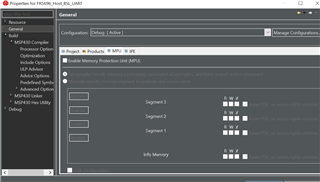Other Parts Discussed in Thread: BOOSTXL-AUDIO,
Hello everyone,
I am using the BOOSTXL-Audio demo on the MSP430FR5994 to capture audio signals from an external microphone. After this, I calculate the FFT for these signals and then want to calculate some coefficients on the Mel Scale for my application. The code that I use for the Mel calculations is functional on the MSP430 and when in debugging, I can observe all the outputs correctly for every coefficient that is calculated. However, when I am running the code directly, it seems to execute endlessly and never terminates at any point. While I am using floating point operations as that is a bit unavoidable for the task, I do not face any issues with the calculations when in debugging mode. One consistent theme during the entire test is the following warning for different floating point operations: 1531-D: Detected floating point operations. Recommend moving them to RAM during run time as these are processing power intensive. My question is related to this statement. Is there a way in which I can specifically move all my floating point calculations to the RAM during run time? I have already tried creating a secondary RAM Partition and assigned all my global and static variables on to the new RAM partition - however, that ended in the same warning I mentioned above.
I am not completely sure if this is happening because the operations are too long or take up too much processing power - as they all execute correctly during the debugging. I am attaching my library here for reference. The 'lib_mfcc.c' is the main code file in which the entire calculations is carried out.
/*
* libmfcc.c - Code implementation for libMFCC
* Copyright (c) 2010 Jeremy Sawruk
*
* This code is released under the MIT License.
* For conditions of distribution and use, see the license in LICENSE
*/
#include <math.h>
#include "lib_mfcc.h"
/*
* Computes the specified (mth) MFCC
*
* spectralData - array of doubles containing the results of FFT computation. This data is already assumed to be purely real
* samplingRate - the rate that the original time-series data was sampled at (i.e 44100)
* NumFilters - the number of filters to use in the computation. Recommended value = 48
* binSize - the size of the spectralData array, usually a power of 2
* m - The mth MFCC coefficient to compute
*
*/
double GetCoefficient(double* spectralData, unsigned int samplingRate, unsigned int NumFilters, unsigned int binSize, unsigned int m)
{
double result = 0.0f;
double outerSum = 0.0f;
double innerSum = 0.0f;
unsigned int k, l;
// 0 <= m < L
if(m >= NumFilters)
{
// This represents an error condition - the specified coefficient is greater than or equal to the number of filters. The behavior in this case is undefined.
return 0.0f;
}
result = NormalizationFactor(NumFilters, m);
for(l = 1; l <= NumFilters; l++)
{
// Compute inner sum
innerSum = 0.0f;
for(k = 0; k < binSize - 1; k++)
{
innerSum += fabs(spectralData[k] * GetFilterParameter(samplingRate, binSize, k, l));
}
if(innerSum > 0.0f)
{
innerSum = log(innerSum); // The log of 0 is undefined, so don't use it
}
innerSum = innerSum * cos(((m * PI) / NumFilters) * (l - 0.5f));
outerSum += innerSum;
}
result *= outerSum;
return result;
}
/*
* Computes the Normalization Factor (Equation 6)
* Used for internal computation only - not to be called directly
*/
double NormalizationFactor(int NumFilters, int m)
{
double normalizationFactor = 0.0f;
if(m == 0)
{
normalizationFactor = sqrt(1.0f / NumFilters);
}
else
{
normalizationFactor = sqrt(2.0f / NumFilters);
}
return normalizationFactor;
}
/*
* Compute the filter parameter for the specified frequency and filter bands (Eq. 2)
* Used for internal computation only - not the be called directly
*/
double GetFilterParameter(unsigned int samplingRate, unsigned int binSize, unsigned int frequencyBand, unsigned int filterBand)
{
double filterParameter = 0.0f;
double boundary = (frequencyBand * samplingRate) / binSize; // k * Fs / N
double prevCenterFrequency = GetCenterFrequency(filterBand - 1); // fc(l - 1) etc.
double thisCenterFrequency = GetCenterFrequency(filterBand);
double nextCenterFrequency = GetCenterFrequency(filterBand + 1);
if(boundary >= 0 && boundary < prevCenterFrequency)
{
filterParameter = 0.0f;
}
else if(boundary >= prevCenterFrequency && boundary < thisCenterFrequency)
{
filterParameter = (boundary - prevCenterFrequency) / (thisCenterFrequency - prevCenterFrequency);
filterParameter *= GetMagnitudeFactor(filterBand);
}
else if(boundary >= thisCenterFrequency && boundary < nextCenterFrequency)
{
filterParameter = (boundary - nextCenterFrequency) / (thisCenterFrequency - nextCenterFrequency);
filterParameter *= GetMagnitudeFactor(filterBand);
}
else if(boundary >= nextCenterFrequency && boundary < samplingRate)
{
filterParameter = 0.0f;
}
return filterParameter;
}
/*
* Compute the band-dependent magnitude factor for the given filter band (Eq. 3)
* Used for internal computation only - not the be called directly
*/
double GetMagnitudeFactor(unsigned int filterBand)
{
double magnitudeFactor = 0.0f;
if(filterBand >= 1 && filterBand <= 14)
{
magnitudeFactor = 0.015;
}
else if(filterBand >= 15 && filterBand <= 48)
{
magnitudeFactor = 2.0f / (GetCenterFrequency(filterBand + 1) - GetCenterFrequency(filterBand -1));
}
return magnitudeFactor;
}
/*
* Compute the center frequency (fc) of the specified filter band (l) (Eq. 4)
* This where the mel-frequency scaling occurs. Filters are specified so that their
* center frequencies are equally spaced on the mel scale
* Used for internal computation only - not the be called directly
*/
double GetCenterFrequency(unsigned int filterBand)
{
double centerFrequency = 0.0f;
double exponent;
if(filterBand == 0)
{
centerFrequency = 0;
}
else if(filterBand >= 1 && filterBand <= 14)
{
centerFrequency = (200.0f * filterBand) / 3.0f;
}
else
{
exponent = filterBand - 14.0f;
centerFrequency = pow(1.0711703, exponent);
centerFrequency *= 1073.4;
}
return centerFrequency;
}
Let me know if any other details are necessary. Thank you!
Regards,
Siddhant


